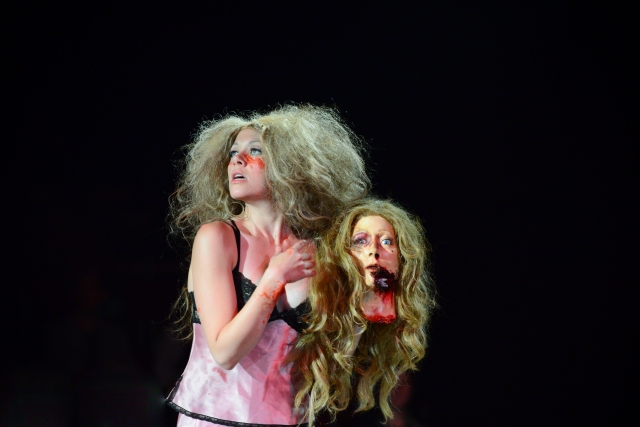
The Hypocrites. All Our Tragic, 2014 (performance still); written by Sean Graney; performed August 2–October 5, 2014, and June 20–August 16, 2015. Courtesy of The Hypocrites.
I haven’t cried since the summer before I went to college and broke up with my high-school girlfriend. And by cried, I mean like when your face starts uncontrollably heaving and your throat tries to climb out of your mouth and your eyes don’t so much shed tears as they vomit them. It’s been ten years since then, but I remember that it felt good. It felt right. It felt cathartic.
The idea of catharsis in art goes back to Aristotle’s Poetics, wherein he defines formal tragedy as, in part, containing “pity and fear effecting the proper purgation of these emotions.”[1] To experience catharsis is to experience emotional cleansing through release; it is not why people cry but it is why people let themselves cry.
I have spent the past four years reviewing theater in Chicago, one of the foremost theater cities in the world. Catharsis and theater have long been intertwined, from Oedipus’s offstage howl at the sight of Jocasta’s corpse, to King Lear raging at the storm, to Stanley Kowalski’s anguished “Stella!” Bertolt Brecht knew his audiences expected catharsis; that’s how he made a career out of denying it to them.
Catharsis is also why I have sometimes spent nights locked in my room, watching YouTube videos of soldiers coming home to their wives, children, and pets. I mainline the stuff. From the privacy of my own Internet connection, I can instantly access a vast, Borgesian library of feels. And so far none of it has worked.
“Soldiers Coming Home Surprise Compilation 2015–16”; screen grab; YouTube;
https://www.youtube.com/watch?v=Rsyrzg2sA-0.
When I go to the theater, the search for catharsis is the same, but the result is more discouraging. I find even less catharsis at the theater than I do online. And this time, the problem isn’t me. The Internet is flooded with cathartic content and can deliver it in an instant. Anyone with a smartphone carries catharsis in their pocket. It has theatre hopelessly outmatched.
As such, the best shows that I have seen in Chicago no longer focus on enacting a private catharsis. They’ve gotten out of that game altogether. Instead, they seek to create a communal catharsis, one in which the barrier between the actor and the audience is broken down, and the experience is shared freely, back and forth between them. It’s something that can only be created IRL, the one place the Internet still can’t quite reach.
Two plays in particular come to mind: The House Theatre of Chicago’s Hammer Trinity and The Hypocrites’ All Our Tragic. Both are examples of marathon theater, an informal movement wherein shows last anywhere between five and twelve hours. A forerunner was Tom Stoppard’s nine-hour Coast of Utopia trilogy, in 2002. But the initiator is generally considered the 2006 play Gatz by the New York City–based experimental troupe, Elevator Repair Service, which was seven hours long, and its text was the entirety of The Great Gatsby. Defying all expectations, the play was a massive success.
The Hammer Trinity consists of three full-length plays that, when shown back to back, total nine hours. It is a gleeful, Americanized mash-up of fantasy tropes—knights, dragons, pirates, lone gunslingers, zeppelin fleets—culminating in a final act that features one climactic battle scene after another. The audience was encouraged to make as much noise as possible — this was a nightly occurrence, a tradition of the House Theater — so we whooped and clapped and cheered as the heroes rode to victory. It felt like Tinkerbell: if we didn’t clap, we weren’t sure that they would make it.
All Our Tragic was created by The Hypocrites’ artistic director, Sean Graney, long known for his funky, promenade-style reinvigorations of classical plays. Over a whopping twelve hours, the play sliced and diced all thirty-two extant Greek tragedies into a single raucous parade of slaughter. The show, which first premiered in 2014, traced a line of fate and vengeance that stretched from Prometheus and Hercules through Medea, Phaedra, and the doomed rulers of Thebes and on through Iphigenia, the Trojan War, Clytemnestra, and Orestes. The play is filled with blood and loss, but in Graney’s hands it is also very jolly, funny, and self-aware. It’s a twelve-hour play designed for people with ADHD.
Both shows created an experience that required a substantial, full-day commitment from its audience members, and so also took great pains to foster a sense of community. Both featured meal breaks, during which cast and audience members dined together, and numerous shorter intermissions, during which the actors strolled about, happily chatting with all. As the hours wore on, fellow audience members began to feel like old friends. Regardless of the private catharsis the plays delivered, the more important feeling was one of togetherness, of the individual released into the greater whole. Instead when the shows ended, the audience didn’t just applaud the players; we applauded ourselves as well. This was our catharsis.
—
[1] Purgation is the English translation of the Greek word katharsis. S.H. Butcher, trans., “Poetics by Aristotle,” Part 6, The Internet Classics Archive, https://classics.mit.edu/Aristotle/poetics.html